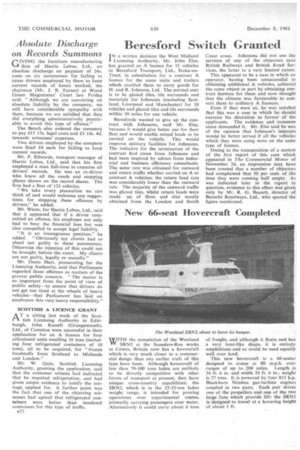Absolute Discharge on Records Summons
Page 56

If you've noticed an error in this article please click here to report it so we can fix it.
GIVING the furniture manufacturing firm of Harris Lebus, Ltd., an absolute discharge on payment of 24s, costs on six summonses for failing to cause drivers employed by them to keep current records of hours worked, the chairman (Mr. J. B. Turner) at Wood Green Magistrates' Court last Friday said: "Although we are convicting on absolute liability by the company, we still have considerable sympathy with them, because we are satisfied that they did everything administratively practicable to avoid this type of offence."
The Bench also ordered the company to pay £15 15s, legal costs and E3 14s. 4d. towards witnesses' expenses.
Two drivers employed by the company were fined £4 each for failing to keep current records.
Mr. P. Edwards, transport manager of Harris Lebus, Ltd., said that his firm employed a man full-time to examine all drivers' records. He was an ex-driver who knew all the roads and stopping places shown on the record sheets. The firm had a fleet of 133 vehicles.
"We take every precaution we can think of and would welcome any suggestions for stopping these offences by drivers," he added.
Mr. Waite, for Harris Lebus, Ltd., said that it appeared that if a driver committed an offence, his employer not only had to bear the financial loss but was also compelled to accept legal liability. "It is an incongruous position," he added. "Obviously my clients had to plead not guilty to these summonses. Otherwise the injustice of this could not be brought before the court. My clients are not guilty, legally or morally."
Mr. Denis Hart, prosecuting for the Licensing Authority, said that Parliament regarded these offences as matters of the gravest public concern. "The matter is so important from the point of view of public safety—to ensure that drivers do not get too tired at the wheels of heavy vehicles—that Parliament has laid on employers this very heavy responsibility."




































































































































